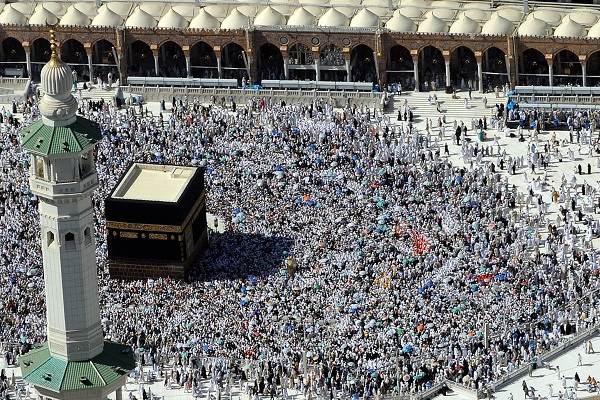I’ve only just got around to watching Tom Holland’s documentary for Channel 4 from earlier this week: ‘Islam: the untold story.’
It had some good things in it, despite suffering from the two problems all documentaries now suffer from: attention-grabbing statements at the end of segments which are not followed up on, and endless shots of the presenter doing strangely unconnected things (travelling on an elevator, sitting on a bed etc.)
But Holland was an engaging and pleasant presenter, and the documentary was something of a landmark in that it finally brought to wider public attention a subject which has been almost completely off-limits in recent years. Because of violence and the threat of violence against scholars, there has been a great unwillingness, even in Western countries, to investigate the origins of Islam in the same historical manner in which other religions are treated. As a result the general public might be forgiven for assuming that Ernst Renan was right in his infamously ill-informed 1851 claim that Islam was different from the other religions because its origins were not ‘covered’ but ‘born in the full light of history.’
As Holland showed, this is not the case: the early years of Islam were distinctly murky. But the scholarship is in its comparative infancy, perhaps only now at the phase the critical methods applied to Christianity were at when Eichhorn was alive. Nevertheless, scholars like IAS‘s Patricia Crone are working away at separating the un-provable religious claims from the provable historical ones.
The problem such scholarship has had in recent years was however still on display in Holland’s programme. That is censorship, self-censorship and a combination of the two.
For instance, Holland spent a lot of his programme in Jerusalem – a city of relative unimportance in Islam. Many establishing shots were presented of Israel’s security fence and CCTV cameras in the centre of the old city. But what Holland at no point mentioned was why he had not gone to film in another city which – mistakenly or otherwise – is far more important in Islam: Mecca. The reason is that Holland is not a Muslim and so is not only unable to film in Mecca but also is not allowed to go there. I think this is quite an important point and though I waited for it to be made, it never was. Holland simply refrained from saying why, throughout his programme, he was stuck in the countries he could travel in freely (Israel and Jordan).
But this self-censorship was nothing compared to what certain ‘spokespeople’ would have had. Because, predictably enough, another reason why the programme had not been made before has been shown in certain ‘community spokesmen’s’ responses.
So the secretary general of the Muslim Council of Britain has written a formal complaint to the heads of Channel 4, registering ‘the Muslim community’s strong disapproval of the programme.’ How the MCB does or does not know what ‘the Muslim community’ (isn’t this what Tariq Ramadan calls ‘essentialising’?) approves or disapproves of is not clear. You can read their letter here:
But the MCB are not the only ones trying to censor historical inquiry. Earlier this year an organisation called The Ramadhan Foundation was given high praise in the media when its chief executive, Mohammed Shafiq, was bold enough to take a critical stance towards a gang of Muslim men in the North of England who were gang-raping underage girls. It is worth reading Mr Shafiq’s response to Channel 4, on behalf of his foundation.
Of course he ‘strongly condemns’ the programme which, he says:
‘…makes a mockery of impartial and objective broadcasting. This distorted, biased programme did not have the decency to check its facts and has broadcast lies. I am disappointed that an international broadcaster like Channel 4 has behaved in unbelievable way.’
‘…I draw the conclusion he [Tom Holland] did not want the real truth but wanted to promote his utter rubbish.’
Towards the end of this Mr Shafiq says:
‘The British Muslim community will not allow Channel 4 to distort our faith and our history.’
Is that a threat? It doesn’t seem a very moderate way of responding to an interesting programme. He concludes:
‘The Ramadhan Foundation calls on Channel 4 to apologise for this programme, withdraw it from online viewing and also order an immediate inquiry into why this was allowed to be broadcast. How many Muslims Scholars, community leaders were given a copy of this programme before transmission? Whether historic facts in relation to Islam were verified by the presenter and who his sources were.’
Gosh! Did Channel 4 know that they had to pass their programmes by ‘community leaders’? Who will censor programmes for the rest of us?
Many other self-appointed Muslim spokespeople have said similar things and Channel 4 has now received so many complaints that Holland has replied to some of them on the Channel 4 website. This demonstrates again, if demonstration were needed, that for many Muslims, approaching the history of Islam in a historical way, let alone a critical way, remains completely off limits.
You cannot entirely blame them. Many Christians felt the same way when their religion became the subject of real scholarship. But the complainants should know that history shows they are on the losing side. Once the process of critical inquiry begins it cannot be reversed. The force of reason which fundamentally changed the debate over Christianity will do the same with Islam. It will be painful, but it cannot be stopped.







Comments